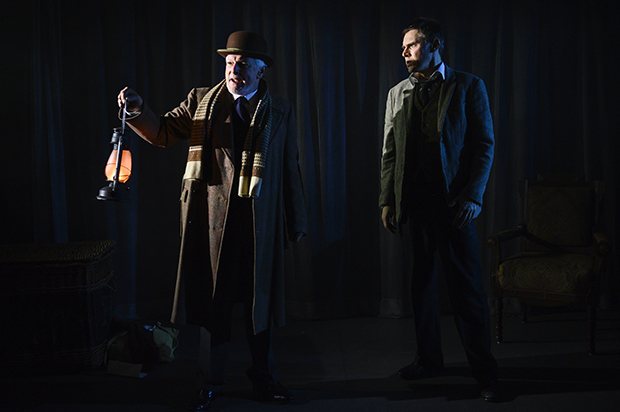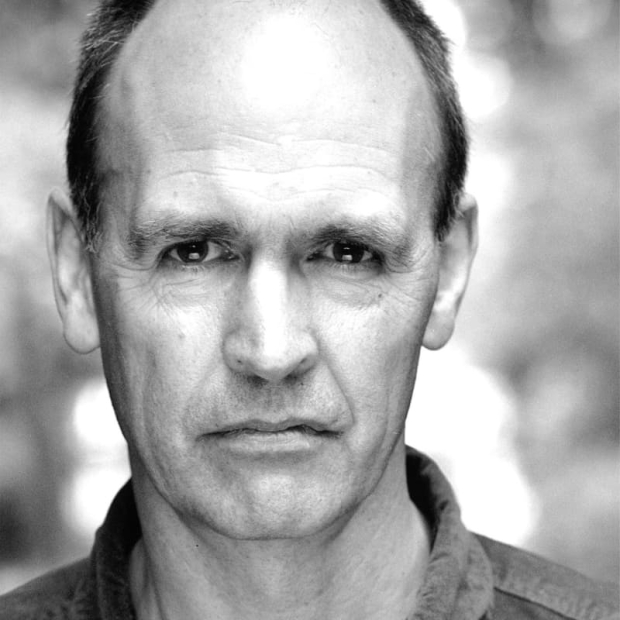Interview: Scaring Up Robin Herford, Longtime Director of the Terrifying Woman in Black
Herford brings his haunting drama to New York and San Francisco this fall and winter.

(© Jenny Anderson)
"Americans scream really loudly in London," Robin Herford said with a gentle smile. He would know. The gregarious Herford is the director of the famously frightening The Woman in Black, a production he first staged more than 30 years ago.
Now in performances at the McKittrick Hotel, home of the chilling immersive production Sleep No More, The Woman in Black has taken up residence in the Club Car, a small food and drink venue turned performance space. The production stars Ben Porter and David Acton, who previously performed the show in London's West End, and began their New York engagement right before Covid struck.
Based on Susan Hill's 1983 Gothic novel of the same name, The Woman in Black is the second-longest-running nonmusical play in West End history, a runner-up to Agatha Christie's The Mousetrap. It tells the story of Arthur Kipps, an ambitious young lawyer assigned to handle the estate of the recently widowed Alice Drablow. After arriving at Eel Marsh House, the reclusive widow's isolated estate, Kipps begins seeing a mysterious woman dressed in black. She never speaks or even approaches him, but the silent figure inspires absolute terror in the cheerful young man. The local townspeople refuse to discuss or even acknowledge the woman's presence, but Kipps remains determined to finish his work, unaware of the tragic toll it will take.
The bare-bones production is the result of what Herford calls "a wonderful happy accident." While running the Stephen Joseph Theatre in Scarborough, England, Herford found himself with a small financial surplus. Having been advised to spend it all before the end of the year, he commissioned playwright Stephen Mallatratt to adapt a ghost story for the Christmas season.
"It wasn't exactly a dream commission," Herford said. He could only cast four people, the budget for the set and costumes was 1,000 pounds, and the show would be staged in the theater's 70-seat pub. "A Christmas stocking filler is what I was looking for," he recalled.

(handout image)
Hill's novel would not seem the idea choice for an adaptation – Herford actually dismissed the idea at first. With far more than four characters, the novel is filled with richly detailed descriptions of Kipps's surroundings, evoking a chilling feeling of suspense. A "tall, gaunt house of gray stone with a slate roof that now gleamed steelily into the light," surrounded by dangerously high marshes, contributes to a "sense of oppressive hatred and malevolence, of someone's evil and also of terrible grief and distress," quickly convincing the pragmatic lawyer that ghosts do exist.
Malatratt's script condenses the story. Arthur (Acton), still haunted by his encounter with the title character, plans to share his encounter with his family in hopes of freeing himself from the ghosts of his past. However, acting isn't his forte. After hiring a young actor (Porter) to coach him in performance, the two swap roles so Porter plays the part of young Arthur and Acton, everyone else. A combination of acting classes and an exorcism, a play within the play ensues.
"The first act is hard work," Herford said. "You have to get the audience on your side and get them to commit to what the project is. Without their imagination, the play won't fly. And what I try and do is engage the audience's intelligence as well as their imagination. They have to work quite hard in those first scenes to work out what's happening. That way they sort of commit themselves to the story."

(© Jenny Anderson)
While the characters of The Woman in Black might be cursed, the play has benefited from extremely good luck. Following its premiere in Scarborough, it transferred to London's West End, where it has played since 1989. (Its producer, Peter Wilson, had not even seen the production when he signed on.) Through the years, it has been performed in theaters that range from 400 seats to 2,200 seats. Herford has not only personally directed every new cast, but will return to his performing roots this holiday season. He'll take on the role of Arthur Kipps when he brings his production to the Strand Theatre in San Francisco, December 15-January 16.
Despite the 30-plus years that have passed since the show began, Herford says he still learns something new every time the cast changes, which typically happens every eight or nine months. "The curious thing is, because it's just a two-hander, you really can make the show fresh with two new people. The trick to get out of the way as a director – give them as much guidance as they need but don't cramp their style."
Despite spending more than three decades scaring people, Herford is not a fan of horror movies. "I'm a complete horror wimp," he said. "I've never seen The Exorcist, Alien – I can't bear that. But [The Woman in Black] speaks to me. It's about people and a human tragedy. And how everyone becomes victims, even unwitting bystanders."

(© Jenny Anderson)











